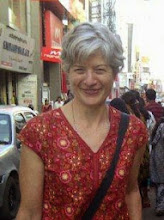1.
Several years ago, I passed out right after getting out of bed in the morning. It was probably due to postural hypotension but as I gradually became aware of myself again - of being - but I could still remember the utter absence of everything - of awareness, of thought, of surroundings, of self.
For me, death seems a bit like that experience of absence. I imagine death as a period of darkness, followed by a gradual dawning of awareness of... of something else. What that other environment will be like, I don't know. Really, the only thing I find myself hoping for is the ability to cope, and, if one has choice, to make the right decision.
The concepts of heaven and hell seem rather childish to me, not to mention limited in scope. I find it difficult to imagine meeting "God," at least any "God" that fits the mental image of God created by most religionists. I think the gradual awareness of an intelligence other than mine/human would be a better understanding of god. I really don't fear death or dying, though this process of dying fills me with some trepidation. I hope it will be quick.
2.
My favorite aunt died a few years ago. I was unable to attend the funeral and perhaps this is why I haven't really thought of her as dead. I still see her in dreams very much as shed had been alive.
What I have learned form the death of others is how important it is to lead a life that makes you happy and fulfills you. People speak of wanting to have a good reputation or a legacy of a body of work, but that is not what endures.
What we truly leave behind in others is what they have picked up about us almost subconsciously. People rarely speak ill of the dead, and almost always forgive, but the truth is they rarely forget that which they have never consciously known. The mother of a friend of mine died many years ago, and though I had only known her when I was a child all I remember of her is anger. She was always very pleasant to me and I never saw her angry at anyone, in fact I remember being envious of my friend for having such a cool, even tempered mother.
But now, when I look back and remember her all I think about is an impression of roiling frustration and anger and disappointment in her. I had the opportunity to meet my friend again as an adult and it turned out that my own impression of his mother was in fact more accurate than the impression she had tried to convey to the world.
So I have no doubt that the impression we leave in the hearts of others is of far more enduring substance than the impression we leave in their minds. And by "heart" I don't mean the heart that is sentimental and loving, but the innermost organ that silently perceives the truth.
My own brush with death came when I had a cancer scare a few years ago. All I remember is the feeling of being incomplete, of things left undone, of experiences not had.
Oddly enough once the scare was over, I felt no need to go out and have those experiences and fulfill myself. Rather it led to a desire to be less attached to the world & let go. To do my duties and move on so that there is nothing that pulls me back when I die.
I don't believe in reincarnation, but I do believe one can make oneself perfectly miserable in the next life as in this, by wanting unimportant things.
3.
I hardly gave death much thought till I hit my 40's. Now I am more aware of the ephemeral nature of our existence, of how quickly time passes.
The realization of death makes me realize how important are the things we focus on and fill our time with, but even the realization is a double edged sword, for this pardon is that even the least important thing should be done with one's whole heart and substance. To do less, to be inconstant, to allow one's attention to be elsewhere creates a division in oneself that never has a happy result.
4.
My deepest hope for my death are that I pass peacefully, and quietly in happy surroundings.
My most honest fear is living my last years unhappy so that death comes as a relief. I honestly don't want death to be a release from suffering - such a concept actually demeans the mystery of the transition.
I would like death to be an adventure rather than a relief, and like all adventures, would like to anticipate it with curiosity, eagerness and vitality and excitement.

No comments:
Post a Comment